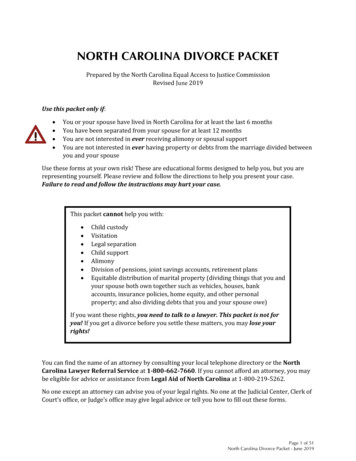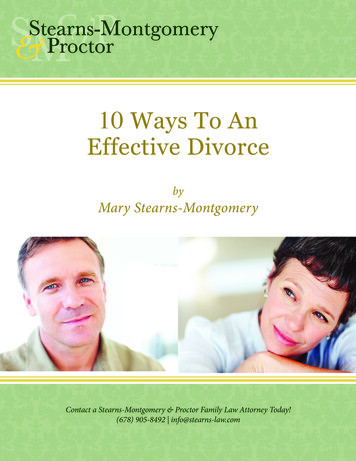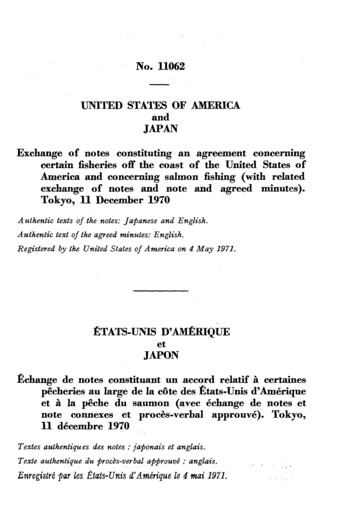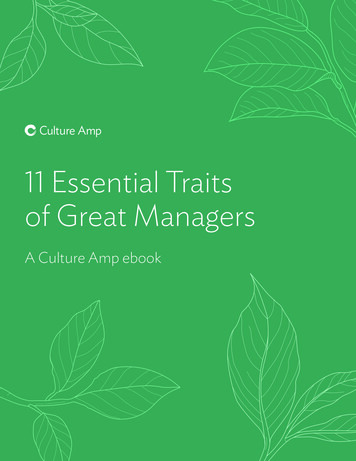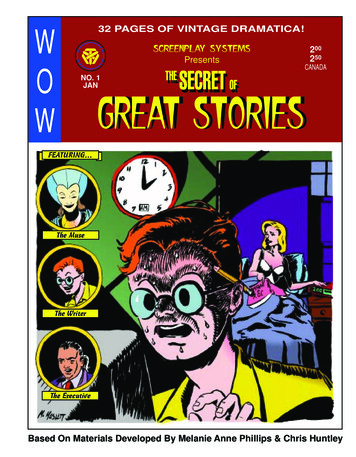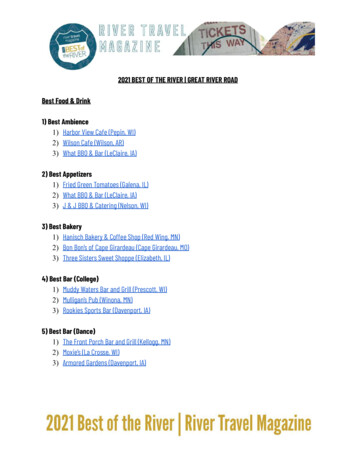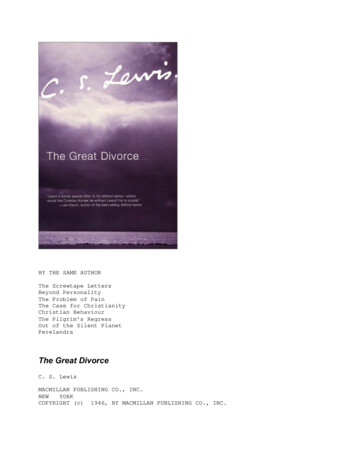
Transcription
BY THE SAME AUTHORThe Screwtape LettersBeyond PersonalityThe Problem of PainThe Case for ChristianityChristian BehaviourThe Pilgrim's RegressOut of the Silent PlanetPerelandraThe Great DivorceC. S. LewisMACMILLAN PUBLISHING CO., INC.NEWYORKCOPYRIGHT (c) 1946, BY MACMILLAN PUBLISHING CO., INC.
The Great Divorce1.I SEEMED to be standing in a bus queue by the side of a long, mean street. Evening was justclosing in and it was raining. I had been wandering for hours in similar mean streets, always in therain and always in evening twilight. Time seemed to have paused on that dismal moment whenonly a few shops have lit up and it is not yet dark enough for their windows to look cheering. Andjust as the evening never advanced to night, so my walking had never brought me to the better partsof the town. However far I went I found only dingy lodging houses, small tobacconists, hoardingsfrom which posters hung in rags, windowless warehouses, goods stations without trains, andbookshops of the sort that sell The Works of Aristotle. I never met anyone. But for the little crowdat the bus stop, the whole town seemed to be empty. I think that was why I attached myself to thequeue.I had a stroke of luck right away, for just as I took my stand a little waspish woman who wouldhave been ahead of me snapped out at a man who seemed to be with her, "Very well, then. I won'tgo at all. So there," and left the queue. "Pray don't imagine," said the man, in a very dignified voice,"that I care about going in the least. I have only been trying to please you, for peace sake. My ownfeelings are of course a matter of no importance. I quite understand that"-and suiting the action tothe word he also walked away. "Come," thought I, "that's two places gained." I was now next to avery short man with a scowl who glanced at me with an expression of extreme disfavour andobserved, rather unnecessarily loudly, to the man beyond him, "This sort of thing really makes onethink twice about going at all." "What sort of thing?" growled the other, a big beefy person. "Well,"said the Short Man, "this is hardly the sort of society I'm used to as a matter of fact." "Huh!" saidthe Big Man: and then added with a glance at me, "Don't you stand any sauce from him, Mister.You're not afraid of him, are you?" Then, seeing I made no move, he rounded suddenly on theShort Man and said, "Not good enough for you, aren't we? Like your lip." Next moment he hadfetched the Short Man one on the side of the face that sent him sprawling into the gutter. "Let himlay, let him lay," said the Big Man to no-one in particular. "I'm a plain man that's what I am and Igot to have my rights same as anyone else, see?" As the Short Man showed no disposition to rejoin
the queue and soon began limping away, I closed up, rather cautiously, behind the Big Man andcongratulated myself on having gained yet another step. A moment later two young people in frontof him also left us arm in arm. They were both so trousered, slender, giggly and falsetto that I couldbe sure of the sex of neither, but it was clear that each for the moment preferred the other to thechance of a place in the bus. "We shall never all get in," said a female voice with a whine in it fromsome four places ahead of me. "Change places with you for five bob, lady," said someone else. Iheard the clink of money and then a scream in the female voice, mixed with roars of laughter fromthe rest of the crowd. The cheated woman leaped out of her place to fly at the man who had bilkedher, but the others immediately closed up and flung her out. . So what with one thing and anotherthe queue had reduced itself to manageable proportions long before the bus appeared. It was awonderful vehicle, blazing with golden light, heraldically coloured. The Driver himself seemed fullof light and he used only one hand to drive with. The other he waved before his face as if to fanaway the greasy steam of the rain. A growl went up from the queue as he came in sight. "Looks asif he had a good time of it, eh? . Bloody pleased with himself, I bet. . My dear, why can't hebehave naturally?-Thinks himself too good to look at us. . Who does he imagine he is? . All thatgilding and purple, I call it a wicked waste. Why don't they spend some of the money on theirhouse property down here?- God! I'd like to give him one in the ear-'ole." I could see nothing in thecountenance of the Driver to justify all this, unless it were that he had a look of authority andseemed intent on carrying out his job.My fellow passengers fought like hens to get on board the bus though there was plenty of room forus all. I was the last to get in. The bus was only half full and I selected a seat at the back, well awayfrom the others. But a tousle-headed youth at once came and sat down beside me. As he did so wemoved off."I thought you wouldn't mind my tacking on to you," he said, "for I've noticed that you feel just as Ido about the present company. Why on earth they insist on coming I can't imagine. They won't likeit at all when we get there, and they'd really be much more comfortable at home. It's different foryou and me." "Do they like this place?" I asked. "As much as they'd like anything," he answered."They've got cinemas and fish and chip shops and advertisements and all the sorts of things theywant. The appalling lack of any intellectual life doesn't worry them. I realised as soon as I got herethat there'd been some mistake. I ought to have taken the first bus but I've fooled about trying towake people up here. I found a few fellows I'd known before and tried to form a little circle, butthey all seem to have sunk to the level of their surroundings. Even before we came here I'd hadsome doubts about a man like Cyril Blellow. I always thought he was working in a false idiom. Buthe was at least intelligent: one could get some criticism worth hearing from him, even if he was afailure on the creative side. But now he seems to have nothing left but his self-conceit. The lasttime I tried to read him some of my own stuff . . . but wait a minute, I'd just like you to look at it."Realising with a shudder that what he was producing from his pocket was a thick wad oftypewritten paper, I muttered something about not having my spectacles and exclaimed, "Hullo!We've left the ground."It was true. Several hundred feet below us, already half hidden in the rain and mist, the wet roofs ofthe town appeared, spreading without a break as far as the eye could reach.
2.I WAS not left very long at the mercy of the Tousle-Headed Poet, because another passengerinterrupted our conversation: but before that happened I had learned a good deal about him. Heappeared to be a singularly ill-used man. His parents had never appreciated him and none of thefive schools at which he had been educated seemed to have made any provision for a talent andtemperament such as his. To make matters worse he had been exactly the sort of boy in whose casethe examination system works out with the maximum unfairness and absurdity. It was not until hereached the university that he began to recognise that all these injustices did not come by chancebut were the inevitable results of our economic system. Capitalism did not merely enslave theworkers, it also vitiated taste and vulgarised intellect: hence our educational system and hence thelack of "Recognition" for new genius. This discovery had made him a Communist. But when thewar came along and he saw Russia in alliance with the capitalist governments, he had foundhimself once more isolated and had to become a conscientious objector. The indignities he sufferedat this stage of his career had, he confessed, embittered him. He decided he could serve the causebest by going to America: but then America came into the war too. It was at this point that hesuddenly saw Sweden as the home of a really new and radical art, but the various oppressors hadgiven him no facilities for going to Sweden. There were money troubles. His father, who had neverprogressed beyond the most atrocious mental complacency and smugness of the Victorian epoch,was giving him a ludicrously inadequate allowance. And he had been very badly treated by a girltoo. He had thought her a really civilised and adult personality, and then she had unexpectedlyrevealed that she was a mass of bourgeois prejudices and monogamic instincts. Jealousy,possessiveness, was a quality he particularly disliked. She had even shown herself, at the end, to bemean about money. That was the last straw. He had jumped under a train. . . .I gave a start, but he took no notice.Even then, he continued, ill luck had continued to dog him. He'd been sent to the grey town. But ofcourse it was a mistake. I would find, he assured me, that all the other passengers would be with meon the return journey. But he would not. He was going to stay "there." He felt quite certain that hewas going where, at last, his finely critical spirit would no longer be outraged by an uncongenialenvironment-where he would find "Recognition" and "Appreciation." Meanwhile, since I hadn't gotmy glasses, he would read me the passage about which Cyril Blellow had been so insensitive. . . .It was just then that we were interrupted. One of the quarrels which were perpetually simmering inthe bus had boiled over and for a moment there was a stampede. Knives were drawn: pistols werefired: but it all seemed strangely innocuous and when it was over I found myself unharmed, thoughin a different seat and with a new companion. He was an intelligent-looking man with a ratherbulbous nose and a bowler hat. I looked out of the windows. We were now so high that all below ushad become featureless. But fields, rivers, or mountains I did not see, and I got the impression thatthe grey town still filled the whole field of vision."It seems the deuce of a town," I volunteered, "and that's what I can't understand. The parts of itthat I saw were so empty. Was there once a much larger population?""Not at all," said my neighbour. "The trouble is that they're so quarrelsome. As soon as anyonearrives he settles in some street. Before he's been there twenty-four hours he quarrels with his
neighbour. Before the week is over he's quarrelled so badly that he decides to move. Very like hefinds the next street empty because all the people there have quarrelled with their neighbours-andmoved. So he settles in. If by any chance the street is full, he goes further. But even if he stays, itmakes no odds. He's sure to have another quarrel pretty soon and then he'll move on again. Finallyhe'll move right out to the edge of the town and build a new house. You see, it's easy here. You'veonly got to think a house and there it is. That's how the town keeps on growing." "Leaving moreand more empty streets?" "That's right. And time's sort of odd here. That place where we caught thebus is thousands of miles from the Civic Centre where all the newcomers arrive from earth. All thepeople you've met were living near the bus stop: but they'd taken centuries-of our time-to get there,by gradual removals.""And what about the earlier arrivals? I mean -there must be people who came from earth to yourtown even longer ago.""That's right. There are. They've been moving on and on. Getting further apart. They're so far off bynow that they could never think of coming to the bus stop at all. Astronomical distances. There's abit of rising ground near where I live and a chap has a telescope. You can see the lights of theinhabited houses, where those old ones live, millions of miles away. Millions of miles from us andfrom one another. Every now and then they move further still. That's one of the disappointments. Ithought you'd meet interesting historical characters. But you don't: they're too far away.""Would they get to the bus stop in time, if they ever set out?""Well-theoretically. But it'd be a distance of light-years. And they wouldn't want to by now: notthose old chaps like Tamberlaine and Genghis Khan, or Julius Caesar, or Henry the Fifth.""Wouldn't want to?""That's right. The nearest of those old ones is Napoleon. We know that because two chaps made thejourney to see him. They'd started long before I came, of course, but I was there when they cameback. About fifteen thousand years of our time it took them. We've picked out the house by now.Just a little pin prick of light and nothing else near it for millions of miles.""But they got there?""That's right. He'd built himself a huge house all in the Empire style-rows of windows flaming withlight, though it only shows as a pin prick from where I live." "Did they see Napoleon?" "That'sright. They went up and looked through one of the windows. Napoleon was there all right." "Whatwas he doing?" "Walking up and down-up and down all the time-left-right, left-right-neverstopping for a moment. The two chaps watched him for about a year and he never rested. Andmuttering to himself all the time. 'It was Soult's fault. It was Ney's fault. It was Josephine's fault. Itwas the fault of the Russians. It was the fault of the English.' Like that all the time. Never stoppedfor a moment. A little, fat man and he looked kind of tired. But he didn't seem able to stop it."From the vibrations I gathered that the bus was still moving, but there was now nothing to be seenfrom the windows which confirmed this -nothing but grey void above and below."Then the town will go on spreading indefinitely?"! said."That's right," said the Intelligent Man. "Unless someone can do something about it." "How doyou mean?"
"Well, as a matter of fact, between you and me and the wall, that's my job at the moment. What'sthe trouble about this place? Not that people are quarrelsome-that's only human nature and wasalways the same even on earth. The trouble is they have no Needs. You get everything you want(not very good quality, of course) by just imagining it. That's why it never costs any trouble tomove to another street or build another house. In other words, there's no proper economic basis forany community life. If they needed real shops, chaps would have to stay near where the real shopswere. If they needed real houses, they'd have to stay near where builders were. It's scarcity thatenables a society to exist. Well, that's where I come in. I'm not going this trip for my health. As faras that goes I don't think it would suit me up there. But if I can come back with some redcommodities-anything at all that you could really bite or drink or sit on -why, at once you'd get ademand down in our town. I'd start a little business. I'd have something to sell. You'd soon getpeople coming to live near-centralisation. Two fully-inhabited streets would accommodate thepeople that are now spread over a million square miles of empty streets. I'd make a nice little profitand be a public benefactor as well.""You mean, if they had to live together they'd gradually learn to quarrel less?""Well, I don't know about that. I daresay they could be kept a bit quieter. You'd have a chance tobuild up a police force. Knock some kind of discipline into them. Anyway" (here he dropped hisvoice) "it'd be better, you know. Everyone admits that. Safety in numbers.""Safety from what?" I began, but my companion nudged me to be silent. I changed my question."But look here," said I, "if they can get everything just by imagining it, why would they want anyreal things, as you call them?""Eh? Oh well, they'd like houses that really kept out the rain.""Their present houses don't?""Well of course not. How could they?""What the devil is the use of building them, then?" The Intelligent Man put his head closer to mine."Safety again," he muttered. "At least, the feeling of safety. It's all right now: but later on . youunderstand.""What?" said I, almost involuntarily sinking my own voice to a whisper.He articulated noiselessly as if expecting that I understood lip-reading. I put my ear close to hismouth. "Speak up," I said. "It will be dark presently," he mouthed."You mean the evening is really going to turn into a night in the end?"He nodded."What's that got to do with it?" said I."Well . no one wants to be out of doors when that happens.""Why?"
His reply was so furtive that I had to ask him several times to repeat it. When he had done so, beinga little annoyed (as one so often is with whisperers) I replied without remembering to lower myvoice."Who are 'They'?" I asked. "And what are you afraid they'll do to you? And why should they comeout when it's dark? And what protection could an imaginary house give if there was any danger?""Here!" shouted the Big Man. "Who's talking all that stuff? You stop your whispering you two ifyou don't want a hiding, see? Spreading rumours, that's what I call it. You shut your face, Ikey,see?""Quite right. Scandalous. Ought to be prosecuted. How did they get into the bus?" growled thepassengers.A fat clean-shaven man who sat on the seat in front of me leaned back and addressed me in acultured voice."Excuse me," he said, "but I couldn't help overhearing parts of your conversation. It is astonishinghow these primitive superstitions linger on. I beg your pardon? Oh, God bless my soul, that's all itis. There is not a shred of evidence that this twilight is ever going to turn into a night. There hasbeen a revolution of opinion on that in educated circles. I am surprised that you haven't heard of it.All the nightmare fantasies of our ancestors are being swept away. What we now see in thissubdued and delicate half-light is the promise of the dawn: the slow turning of a whole nationtowards the light. Slow and imperceptible, of course. 'And not through Eastern windows only,When daylight comes, comes in the light.' And that passion for 'real' commodities which our friendspeaks of is only materialism, you know. It's retrogressive. Earth-bound! A hankering for matter.But we look on this spiritual city-for with all its faults it is spiritual- as a nursery in which thecreative functions of man, now freed from the clogs of matter, begin to try their wings. A sublimethought."Hours later there came a change. It began to grow light in the bus. The greyness outside thewindows turned from mud-colour to mother of pearl, then to faintest blue, then to a bright bluenessthat stung the eyes. We seemed to be floating in a pure vacancy. There were no lands, no sun, nostars in sight: only the radiant abyss. I let down the window beside me. Delicious freshness came infor a second, and then"What the hell are you doing?" shouted the Intelligent Man, leaning roughly across me and pullingthe window sharply up. "Want us all to catch our death of cold?""Hit him a biff," said the Big Man.I glanced round the bus. Though the windows were closed, and soon muffed, the bus was full oflight. It was cruel light. I shrank from the faces and forms by which I was surrounded. They wereall fixed faces, full not of possibilities but of impossibilities, some gaunt, some bloated, someglaring with idiotic ferocity, some drowned beyond recovery in dreams; but all, in one way oranother, distorted and faded. One had a feeling that they might fall to pieces at any moment if thelight grew much stronger. Then-there was a mirror on the end wall of the bus-I caught sight of myown.And still the light grew.
3.A CLIFF had loomed up ahead. It sank vertically beneath us so far that I could not see the bottom,and it was dark and smooth. We were mounting all the time. At last the top of the cliff becamevisible like a thin line of emerald green stretched tight as a fiddle-string. Presently we glided overthat top: we were flying above a level, grassy country through which there ran a wide river. Wewere losing height now: some of the tallest tree tops were only twenty feet below us. Then,suddenly we were at rest. Everyone had jumped up. Curses, taunts, blows, a filth of vituperation,came to my ears as my fellow-passengers struggled to get out. A moment later, and they had allsucceeded. I was alone in the bus, and through the open door there came to me in the fresh stillnessthe singing of a lark.I got out. The light and coolness that drenched me were like those of summer morning,early morning a minute or two before the sunrise, only that there was a certain difference. I had thesense of being in a larger space, perhaps even a larger sort of space, than I had ever known before:as if the sky were further off and the extent of the green plain wider than they could be on this littleball of earth. I had got "out" in some sense which made the Solar System itself seem an indooraffair. It gave me a feeling of freedom, but also of exposure, possibly of danger, which continued toaccompany me through all that followed. It is the impossibility of communicating that feeling, oreven of inducing you to remember it as I proceed, which makes me despair of conveying the realquality of what I saw and heard.At first, of course, my attention was caught by my fellow-passengers, who were still grouped aboutin the neighbourhood of the omnibus, though beginning, some of them, to walk forward into thelandscape with hesitating steps. I gasped when I saw them. Now that they were in the light, theywere transparent-fully transparent when they stood between me and it, smudgy and imperfectlyopaque when they stood in the shadow of some tree. They were in fact ghosts: man-shaped stainson the brightness of that air. One could attend to them or ignore them at will as you do with the dirton a window pane. I noticed that the grass did not bend under their feet: even the dew drops werenot disturbed.Then some re-adjustment of the mind or some focussing of my eyes took place, and I saw thewhole phenomenon the other way round. The men were as they always had been; as all the men Ihad known had been perhaps. It was the light, the grass, the trees that were different; made of somedifferent substance, so much solider than things in our country that men were ghosts bycomparison. Moved by a sudden thought, I bent down and tried to pluck a daisy which wasgrowing at my feet. The stalk wouldn't break. I tried to twist it, but it wouldn't twist. I tugged tillthe sweat stood out on my forehead and I had lost most of the skin off my hands. The little flowerwas hard, not like wood or even like iron, but like diamond. There was a leaf-a young tender beechleaf, lying in the grass beside it. I tried to pick the leaf up: my heart almost cracked with the effort,and I believe I did just raise it. But I had to let it go at once; it was heavier than a sack of coal. As Istood, recovering my breath with great gasps and looking down at the daisy, I noticed that I couldsee the grass not only between my feet but through them. I also was a phantom. Who will give mewords to express the terror of that discovery? "Golly!" thought I. "I'm in for it this time."
"I don't like it! I don't like it," screamed a voice, "It gives me the pip!" One of the ghosts had dartedpast me, back into the bus. She never came out of it again as far as I know.The others remained, uncertain."Hi, Mister," said the Big Man, addressing the Driver, "when have we got to go back?""You need never come back unless you want to," he replied. "Stay as long as you please." Therewas an awkward pause."This is simply ridiculous," said a voice in my ear. One of the quieter and more respectable ghostshad sidled up to me. "There must be some mismanagement," he continued. "What's the sense ofallowing all that riff-raff to float about here all day? Look at them. They're not enjoying it. They'dbe far happier at home. They don't even know what to do.""I don't know very well myself," said I. "What does one do?""Oh me? I shall be met in a moment or two. I'm expected. I'm not bothering about that. But it'srather unpleasant on one's first day to have the whole place crowded out with trippers. Damn it,one's chief object in coming here at all was to avoid them!"He drifted away from me. And I began to look about. In spite of his reference to a "crowd," thesolitude was so vast that I could hardly notice the knot of phantoms in the foreground. Greennessand light had almost swallowed them up. But very far away I could see what might be either a greatbank of cloud or a range of mountains. Sometimes I could make out in it steep forests, farwithdrawing valleys, and even mountain cities perched on inaccessible summits. At other times itbecame indistinct. The height was so enormous that my waking sight could not have taken in suchan object at all. Light brooded on the top of it: slanting down thence it made long shadows behindevery tree on the plain. There was no change and no progression as the hours passed. The promiseor the threat-of sunrise rested immovably up there.Long after that I saw people coming to meet us. Because they were bright I saw them while theywere still very distant, and at first I did not know that they were people at all. Mile after mile theydrew nearer. The earth shook under their tread as their strong feet sank into the wet turf. A tinyhaze and a sweet smell went up where they had crushed the grass and scattered the dew. Some werenaked, some robed. But the naked ones did not seem less adorned, and the robes did not disguise inthose who wore them the massive grandeur of muscle and the radiant smoothness of flesh. Somewere bearded but no one in that company struck me as being of any particular age. One getsglimpses, even in our country, of that which is ageless-heavy thought in the face of an infant, andfrolic childhood in that of a very old man. Here it was all like that. They came on steadily. I did notentirely like it. Two of the ghosts screamed and ran for the bus. The rest of us huddled closer to oneanother.4.As THE solid people came nearer still I noticed that they were moving with order anddetermination as though each of them had marked his man in our shadowy company. "There aregoing to be affecting scenes," I said to myself. "Perhaps it would not be right to look on." With that,I sidled away on some vague pretext of doing a little exploring. A grove of huge cedars to my right
seemed attractive and I entered it. Walking proved difficult. The grass, hard as diamonds to myunsubstantial feet, made me feel as if I were walking on wrinkled rock, and I suffered pains likethose of the mermaid in Hans Andersen. A bird ran across in front of me and I envied it. Itbelonged to that country and was as real as the grass. It could bend the stalks and spatter itself withthe dew.Almost at once I was followed by what I have called the Big Man-to speak more accurately, theBig Ghost. He in his turn was followed by one of the bright people. "Don't you know me?" heshouted to the Ghost: and I found it impossible not to turn and attend. The face of the solid spirit-hewas one of those that wore a robe-made me want to dance, it was so jocund, so established in itsyouthfulness."Well, I'm damned," said the Ghost. "I wouldn't have believed it. It's a fair knock-out. It isn't right,Len, you know. What about poor Jack, eh? You look pretty pleased with yourself, but what I say is,What about poor Jack?""He is here," said the other. "You will meet him soon, if you stay." "But you murdered him." "Ofcourse I did. It is all right now." "All right, is it? All right for you, you mean. But what about thepoor chap himself, laying cold and dead?""But he isn't. I have told you, you will meet him soon. He sent you his love.""What I'd like to understand," said the Ghost, "is what you're here for, as pleased as Punch, you, abloody murderer, while I've been walking the streets down there and living in a place like a pigstyeall these years.""That is a little hard to understand at first. But it is all over now. You will be pleased about itpresently. Till then there is no need to bother about it.""No need to bother about it? Aren't you ashamed of yourself?""No. Not as you mean. I do not look at myself. I have given up myself. I had to, you know, after themurder. That was what it did for me. And that was how everything began.""Personally," said the Big Ghost with an emphasis which contradicted the ordinary meaning of theword, "personally, I'd have thought vou and I ought to be the other way round. That's my personalopinion.""Verv likelv we soon shall be." said the other. "If you'll stop thinking about it.""Look at me, now," said the Ghost, slapping its chest (but the slap made no noise). "I gone straightall my life. I don't say I was a religious man and I don't sav I had no faults, far from it. But I donemy best all my life, see? I done my best by everyone, that's the sort of chap I was. I never asked foranything that wasn't mine by rights. If I wanted a drink I paid for it and if I took my wages I donemy job, see? That's the sort I was and I don't care who knows it.""It would be much better not to go on about that now.""Who's going on? I'm not arguing. I'm just telling you the sort of chap I was, see? I'm asking fornothing but my rights. You may think you can put me down because you're dressed up like that(which you weren't when you worked under me) and I'm only a poor man. But I got to have myrights same as you, see?"
"Oh no. It's not so bad as that. I haven't got my rights, or I should not be here. You will not getyours either. You'll get something far better. Never fear.""That's just what I say. I haven't got my rights. I always done my best and I never done nothingwrong. And what I don't see is why I should be put below a bloody murderer like you.""Who knows whether you will be? Only be happy and come with me.""What do you keep on arguing for? I'm only telling you the sort of chap I am. I only want myrights. I'm not asking for anybody's bleeding charity.""Then do. At once. Ask for the Bleeding Charity. Everything is here for the asking and nothing canbe bought.""That may be very well for you, I daresay. If they choose to let in a bloody murderer all because hemakes a poor mouth at the last moment, that's their lookout. But I don'
I had a stroke of luck right away, for just as Itook my stand a little waspish woman who would have been ahead of me snapped out at a man who seemed to be with her, "Very well, then. I won't go at all. So there," and left the queue. "Pray don't imagine," said the man, in a ve
